Great Value From a Different Era
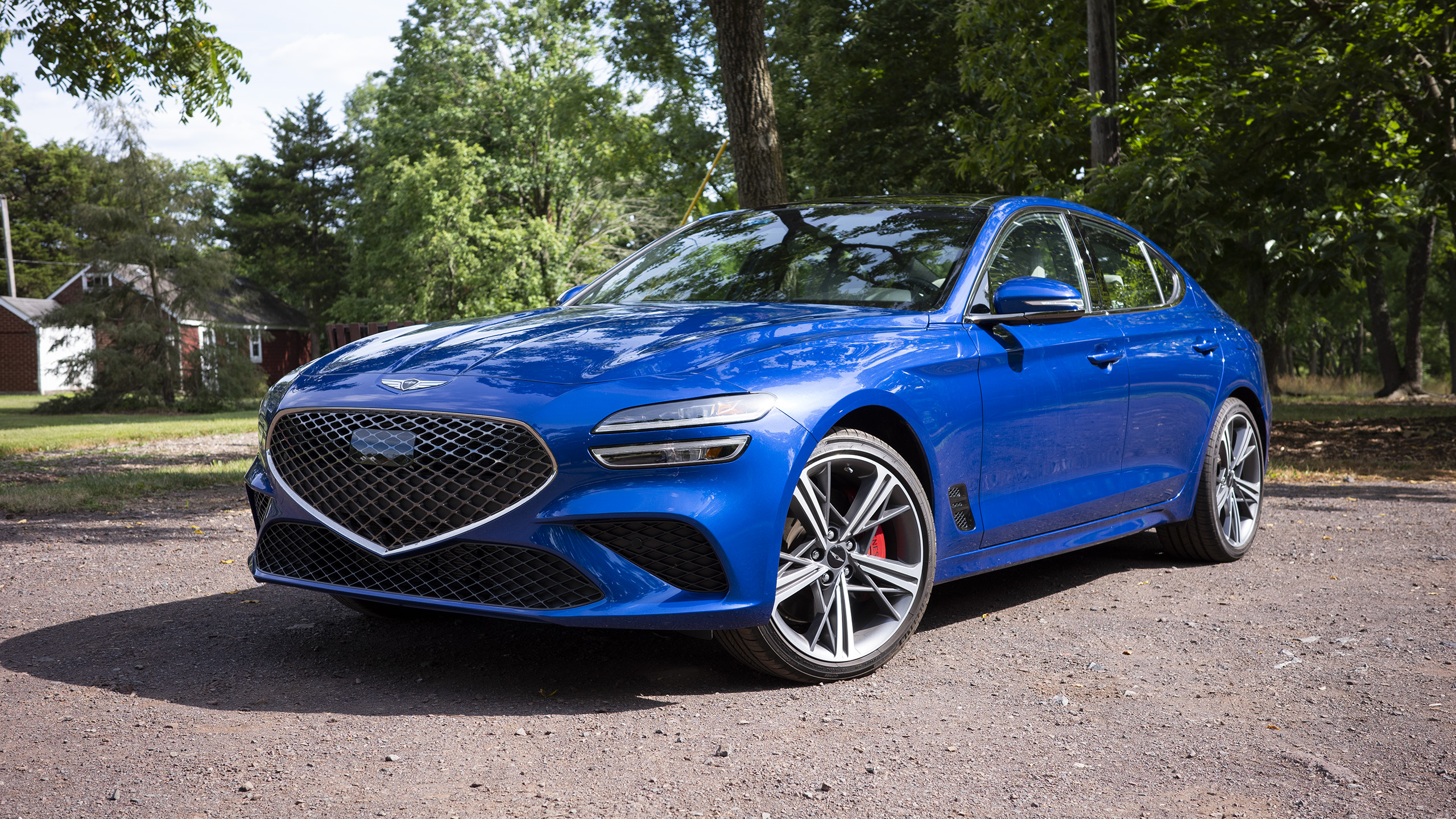
It’s taken Genesis almost a decade of soul-searching to get to where it is today. To become the kind of marque that compels those otherwise indifferent to cars to take notice; to ask, “What is that?” The Hyundai mothership has proven itself to be quite good at that trick as of late. So it’s ironic that what stands out about the 2024 Genesis G70, at least within Genesis’ stable, is how little it stands out.
See, the G70’s greatest sin isn’t just that it’s getting long in the tooth—it’s that it’s so easy to tell. It’s Genesis’ oldest product, having debuted in 2017 and gotten a comprehensive refresh in 2020. If the rest of the lineup wasn’t so dang sharp and outwardly new, the G70 might be aging a little more gracefully. And none of this is to say what’s still here is bad; after all, we’re talking about a rear-wheel-drive sedan with the Kia Stinger’s bones that comes out swinging with a ton of value. But the model is also reportedly on the chopping block, without a successor waiting in the wings. Should that come to pass, I’ll miss the G70, but I’ll miss what it could’ve been even more.


The Basics
While the Genesis G70 has looked more or less the same going back four years, 2024 happens to bring a rather significant iteration for the young luxury brand’s entry-level product. The sedan’s underpowered 2.0-liter turbocharged base mill has been replaced with a new, also boosted 2.5-liter four-cylinder. It’s still in the shadow of a turbocharged 3.3-liter V6 that churns out 368 horsepower and 376 lb-ft of torque, but the smaller motor is no slouch, with 300 hp and 311 lb-ft. Both come mated to an eight-speed auto.
The G70 I drove had that 2.5 liter as well as all-wheel drive. The cheapest sedan on offer costs $43,250 delivered, and four driven wheels add $2,100 to the total. Tack on the Sport Prestige package with its optional wheels, black exterior trim, 19-speaker Lexicon audio, ventilated front seats, and a few other goodies, and you more or less get to my tester’s $49,700 sticker.



That’s a very reasonable price for a sedan that looks very good, especially in this $650 shade Genesis calls Kawah Blue. I always thought the G70 came off like an Alfa Giulia Lite in profile, and that’s not bad company to be in. The 2020 refresh that lent the car Genesis’ modern corporate face, with its double-slash lighting and that wide, rounded diamond grille, certainly aided the sedan’s presence. It’s not quite on the G90’s level, mind—but then, few cars are.
It’s inside where we start to regress a bit, and where the G70 reveals its origins in a brand that still wasn’t quite feeling itself yet. Again, there’s nothing awful about this interior. Some of its arguably dated characteristics, like the analog speedometer and discrete HVAC screen, are actually refreshing in the here and now, and ergonomically everything’s on point. But the GV60 is like a playful, Art Deco Mini from a future where everything’s chrome. The GV70 has that genius oval swoop that frames the climate controls beautifully against a red dash if you so choose. (And why wouldn’t you?) The G90’s wood trim looks like marble. Those cabins all make strong first impressions, and the G70’s doesn’t.
Driving the Genesis G70 2.5T
First, the good news. I never drove the old 2.0-liter, but the 2.5 seems to address the worst thing the G70 had going for it all these years: its base engine. Armed with 48 more hp and 51 lb-ft more torque, the entry-level sedan can still hustle to 60 mph from a standstill in well under six seconds. Not bad, especially when this AWD example is pushing over 3,800 pounds.

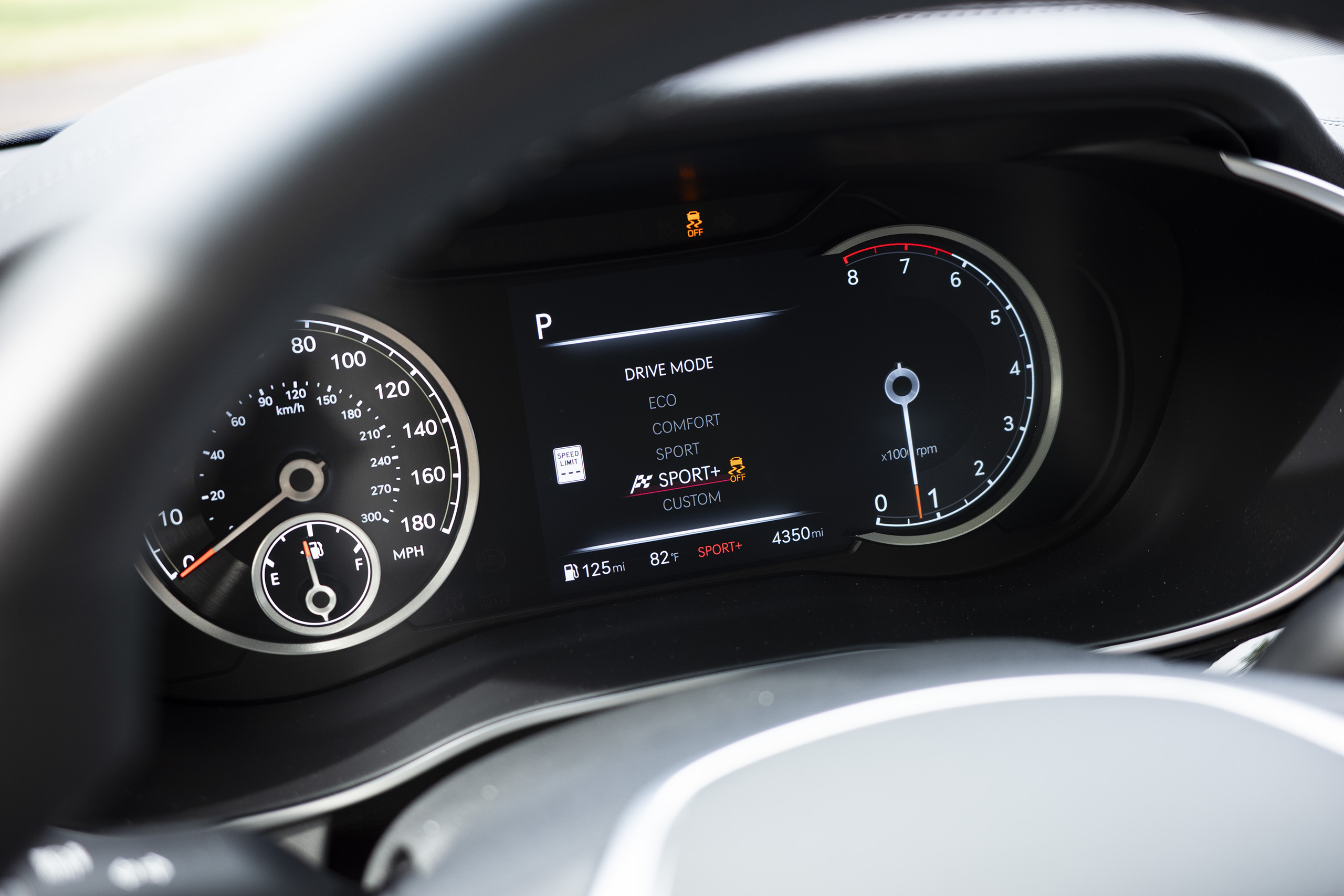


I like this engine, to the point it dampened any FOMO I might’ve had over the V6, but I wish I liked everything around it more. The G70 feels reasonably agile but rarely exciting, with a ride that’s harsh to no real benefit to the dynamics and needlessly heavy steering that comes across like it’s trying to compensate for something. It’s fun, but it also leaves you wanting more. Less roll, perhaps, or a sharper front end. Unfortunately, Genesis restricts the adaptive suspension option to 3.3-equipped models.
It certainly doesn’t help that the eight-speed tempers the hustle, especially at low speeds. The transmission is always too sluggish to downshift like it’s put out anytime you stab the accelerator, coaxing the powertrain to do something it’s never prepared to. Sport Mode tries to address this by keeping you droning in low gears at highway speeds, but that’s hardly smarter logic—just differently wrong.
The Highs and Lows
So, the G70 is a warm, if not piping-hot drive. But that’s somewhat easy to forgive, considering its price. At the mid-$40K mark, you’re getting more than enough power and big Brembo brakes, which feel great and come standard on every sedan. The interior, while not aesthetically noteworthy as we’ve discussed, is nevertheless flush with physical controls for most things. The HVAC panel is also a screen, but its interface is very user-friendly and at least supplies a haptic response to taps, which is better than nothing.
What I especially like about the G70’s tech is that it feels reasonable. Just enough. The central display isn’t overlarge at 10.25 inches, but the software behind it is very smooth and responsive. Going from, say, Toyota’s latest infotainment system in my Corolla to this is like picking up a high-end iPhone or Galaxy for the first time, and marveling at its fast-refresh screen. It’s clever, too. When you summon Siri for voice commands in the G70 or hop on a phone call, the car knows to lower the climate system’s fan speed, if it’s on one of the higher settings. It all comes across like a vehicle that doesn’t overpromise or try to do too much for its own good, and that’s something we could certainly stand to see more of in this segment.





That said, the G70 does show its dated nature in other ways. For example, while it does have a USB-C port—you know, the type of connection phones have been using for the better part of a decade now—it’s actually in the glove box and can only be used for charging. If you want to project your phone over Apple CarPlay or Android Auto, you have to plug into the USB-A port below the center stack. The G70 doesn’t support wireless uses of those platforms, either. Personally, that’s no great loss to me because I find wireless CarPlay to be a temperamental battery hog, but it is something buyers probably expect.

Rear passengers would also likely expect more legroom, but the G70’s space behind front occupants is pretty laughable. It could also use more space for cargo. The load floor is strangely high and the trunk doesn’t extend all that far back. Another reason to lament the North American absence of the G70 Shooting Brake, I suppose.
Genesis G70 2.5T Features, Options, and Competition
$43,250 gets you into a base Genesis G70—rear-wheel drive with the 2.5-liter four-cylinder. All-wheel drive adds $2,100, and unless you want to step up to the V6, the only option left is the Sport Prestige package. For $4,100, this gives you heated and ventilated fully leather seats, a solid Lexicon premium audio system, parking distance sensors, wireless charging, power-operated mirrors, and a big sunroof, along with some special trim here and there.
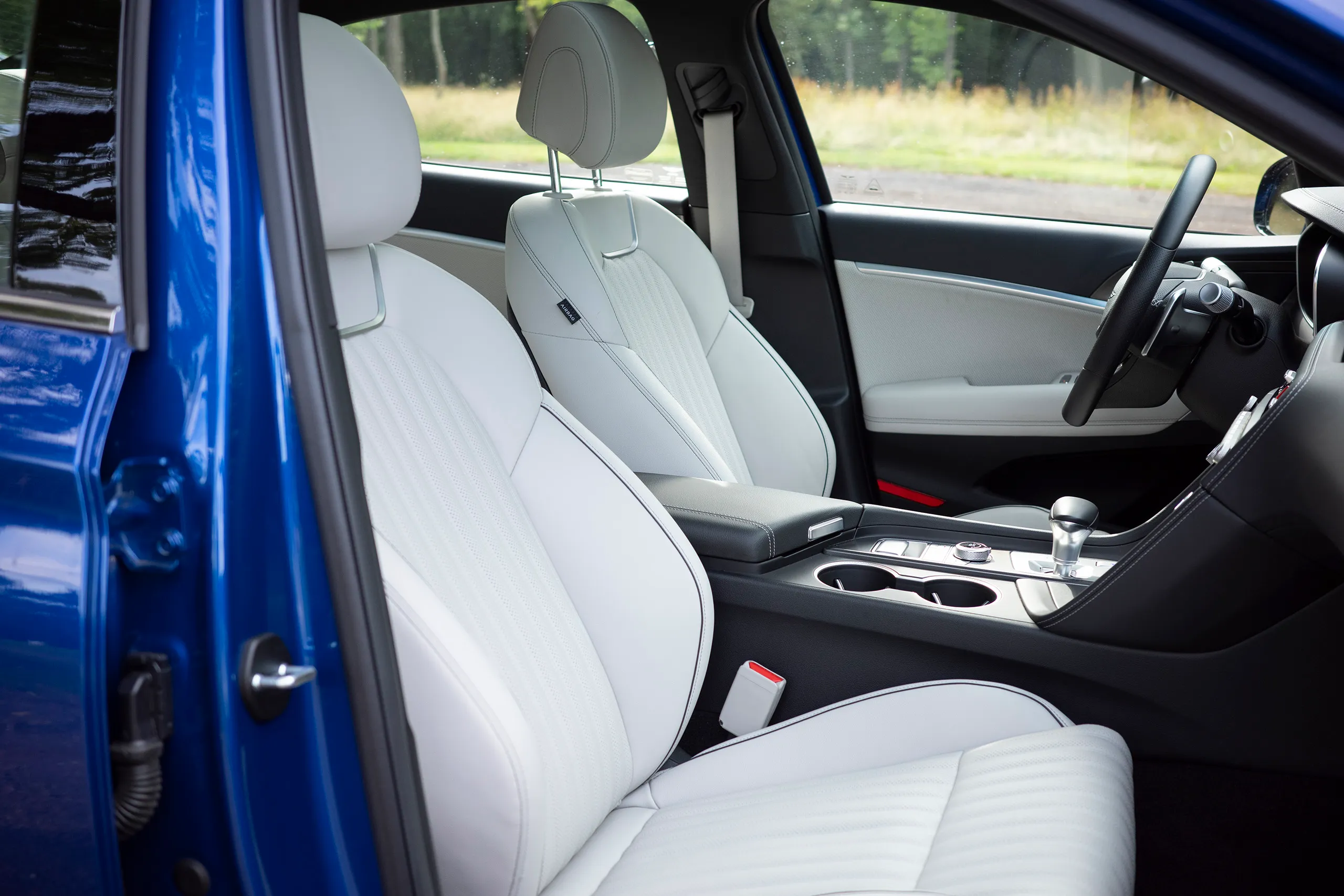
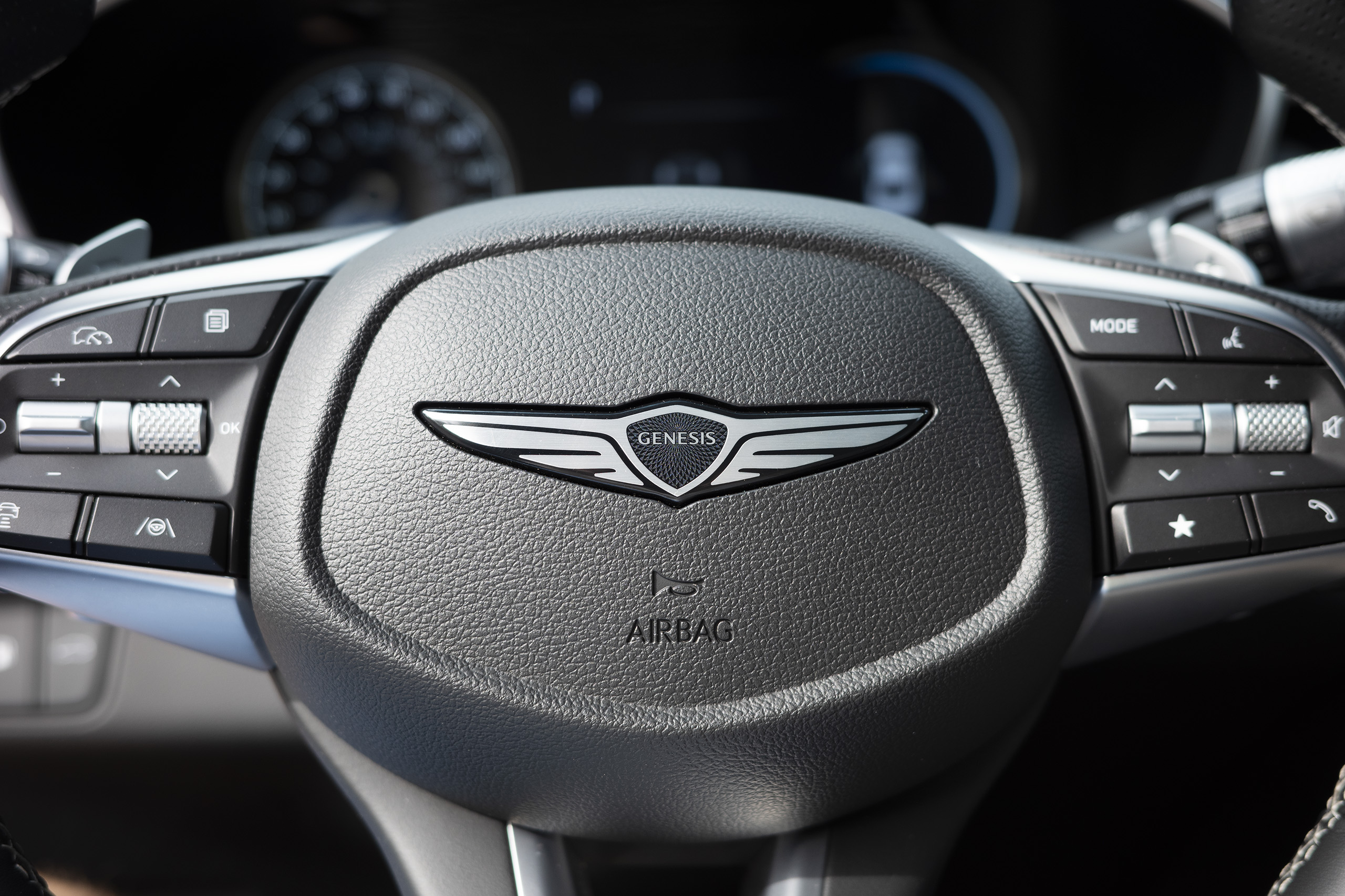

Excluding the $41,375 Lexus IS—which is fundamentally even older than the G70 at this point, having launched in 2013—it’s hard to get into a compact luxury sedan for less. The Alfa Romeo Giulia comes in at $43,285; the Audi A4, which is getting replaced soon, at $43,590 with its measly 201 hp. If you’re drawn to the G70 for its oomph, note that the BMW 330i ($46,675) and Mercedes-Benz C300 ($46,950) both start with 45 fewer hp. The 272-horse Acura TLX, meanwhile, starts at $46,195. Specs aren’t everything, of course, but they put into perspective that the G70 is the strongest value play in its segment.
All that taken into consideration, if it were my money I’d spec the G70 exactly like this tester—only, maybe without all-wheel drive. That’ll save a couple grand and 150 pounds while improving this sedan’s rather underwhelming gas mileage.
Fuel Economy
And let’s talk about that mileage because it isn’t great. The Genesis G70 2.5T AWD is rated at 20 mpg city, 28 highway, and 23 combined. On paper, the RWD sedan gets a 1-mpg bump, but either way, those figures are clearly behind top competitors in the class spec’d the same way: all-wheel-drive with the least potent powertrain on offer. And they proved pretty accurate in my testing. I reckon you could sniff at a 30-mpg average on especially lengthy highway drives, but you’ll have to be very judicious with your right foot to get there, and doubly so to beat estimates at town-cruising speeds.
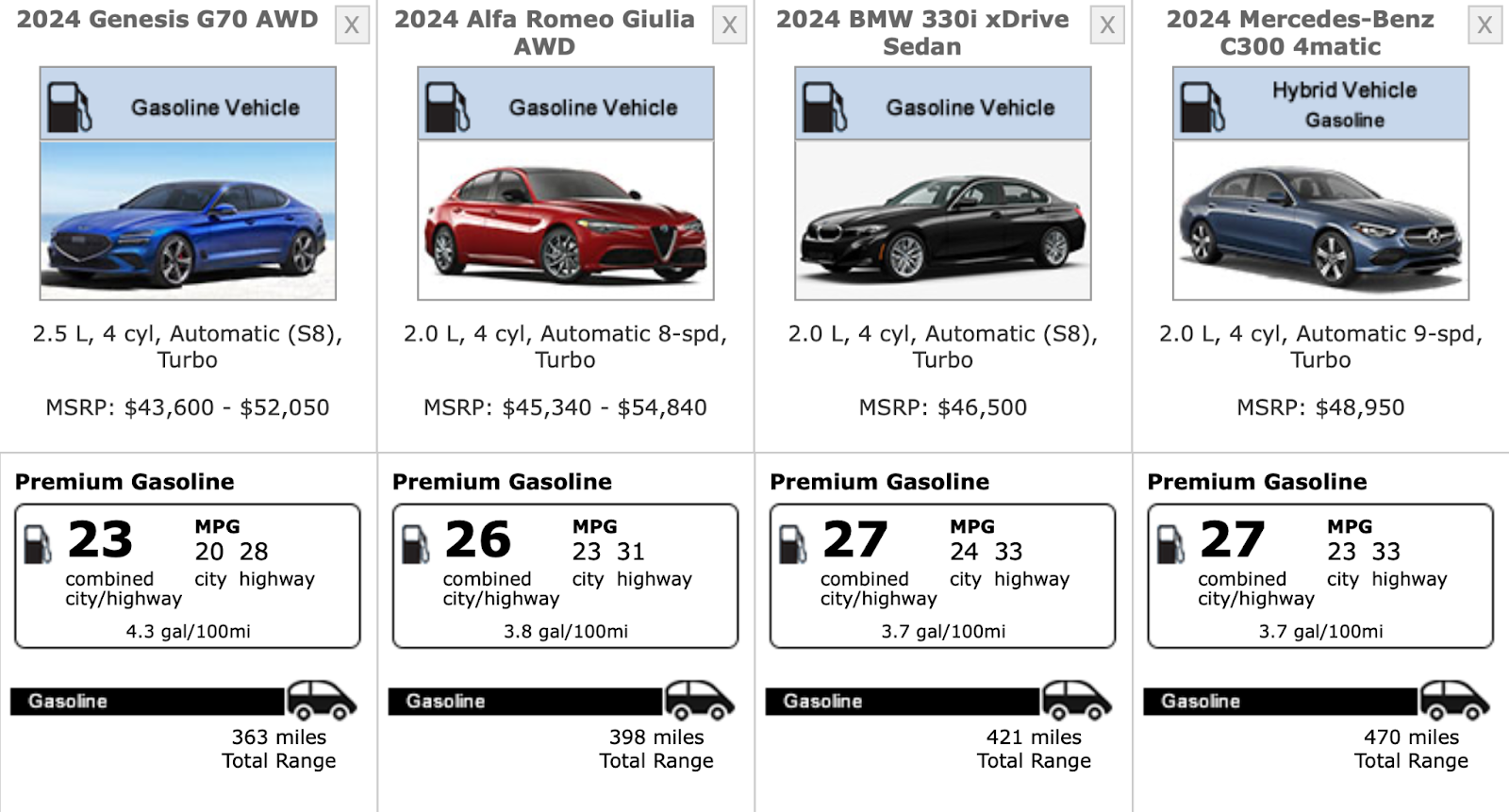
Value and Verdict
I really wanted to walk away from the 2024 Genesis G70 with the sense that spending any more money on a sedan like this would be wasteful. Its value is unquestionable—if you want the most car for the fewest dollars with a baseline expectation for luxury, quality, and performance, this is it. If that was true of the G70 before, the introduction of the 2.5 certainly punctuates it. And yet…
There are simply too many things about Genesis’ entry-level sedan that I’d change if I could. And I think Genesis would, too. The G70 was among its first products, and while it’s remained in the conversation over the years through meaningful upgrades and attractive pricing, the rest of the portfolio demonstrates an automaker truly in its stride. How I’d love to see what that Genesis could do with this car.
| 2024 Genesis G70 2.5T Specs | |
|---|---|
| Base Price (AWD Sport Prestige as tested) | $43,250 ($49,700) |
| Powertrain | 2.5-liter turbocharged inline-four | 8-speed automatic | all-wheel drive |
| Horsepower | 300 @ 5800 rpm |
| Torque | 311 lb-ft @ 1,650-4,000 rpm |
| Seating Capacity | 5 |
| Curb Weight | 3,836 pounds |
| Cargo Volume | 10.5 cubic feet |
| 0-60 mph | 5.7 seconds |
| EPA Fuel Economy: | 20 mpg city | 28 highway | 23 combined |
| Quick Take | The Genesis G70 isn’t the best at anything, but it’s good enough at everything—especially with its new base engine—to earn our attention. |
| Score | 7/10 |



Got a tip? Email me at tips@thedrive.com
Source: www.thedrive.com






